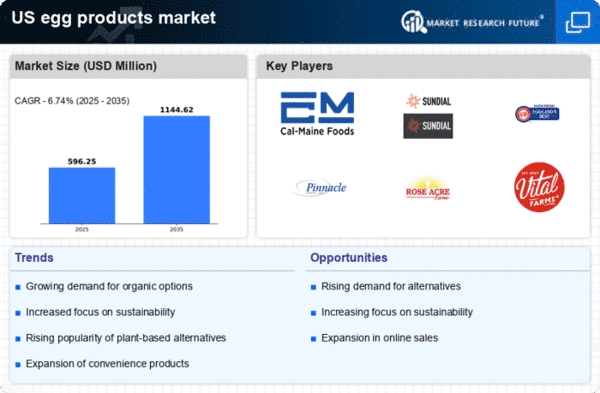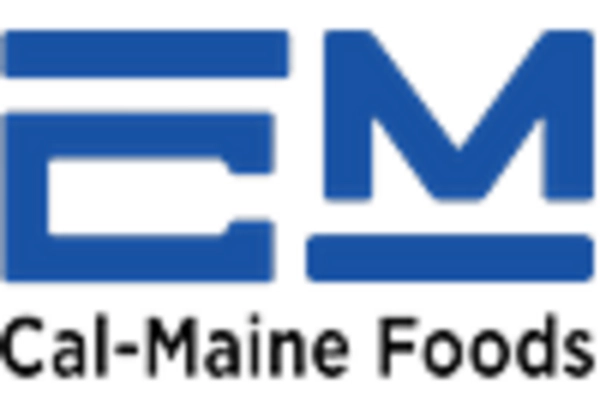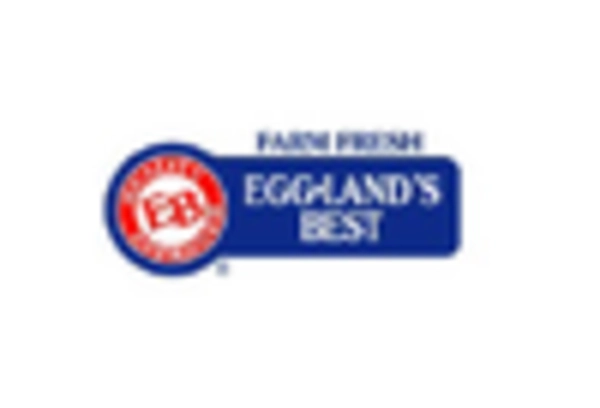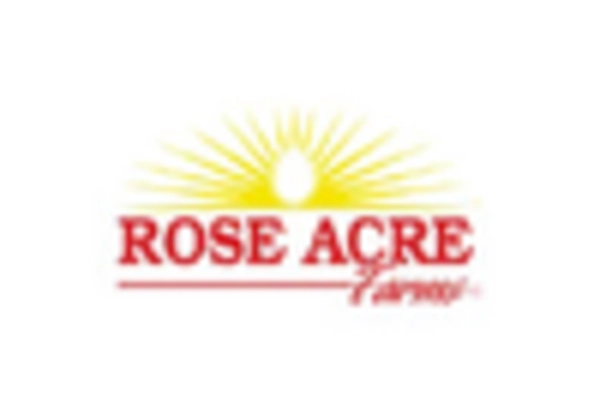Growth of Convenience Foods
The egg products market is significantly influenced by the increasing popularity of convenience foods among busy consumers. As lifestyles become more fast-paced, there is a growing preference for ready-to-eat and easy-to-prepare meal options. Egg products, such as liquid eggs, pre-cooked egg patties, and egg-based snacks, align well with this trend, offering both convenience and nutritional value. In the US, the convenience food sector has expanded, with sales projected to reach $200 billion by 2026. This growth presents a substantial opportunity for the egg products market, as manufacturers innovate to create convenient solutions that meet consumer demands. Additionally, the rise of meal kits and online grocery shopping further supports the demand for egg products, as they are often included as key ingredients in various recipes.
Increasing Demand for Protein-Rich Foods
The egg products market is experiencing a notable surge in demand for protein-rich foods, driven by a growing awareness of health and nutrition among consumers. Eggs are recognized as a high-quality protein source, containing all essential amino acids. This trend is particularly pronounced in the US, where the protein consumption rate has increased by approximately 10% over the past few years. As consumers seek convenient and nutritious options, the egg products market is likely to benefit from this shift towards protein-centric diets. Furthermore, the rise of fitness culture and dietary trends such as keto and paleo diets, which emphasize protein intake, further propels the demand for egg products. Consequently, manufacturers are expanding their offerings to include a variety of egg-based products, catering to the evolving preferences of health-conscious consumers.
Focus on Food Safety and Quality Assurance
The egg products market is increasingly prioritizing food safety and quality assurance, driven by consumer demand for transparency and high standards in food production. In the US, regulatory bodies have implemented stringent guidelines to ensure the safety of egg products, particularly in response to past foodborne illness outbreaks. This focus on safety has led to enhanced quality control measures throughout the supply chain, from farm to table. As consumers become more informed about food safety issues, they are likely to favor brands that demonstrate a commitment to quality and safety. Consequently, companies in the egg products market are investing in advanced technologies and practices to ensure compliance with safety standards, which may enhance consumer trust and brand loyalty. This emphasis on safety not only protects consumers but also strengthens the overall reputation of the egg products market.
Rising Interest in Plant-Based Alternatives
The egg products market is witnessing a shift due to the rising interest in plant-based alternatives. While traditional egg consumption remains strong, there is a growing segment of consumers seeking plant-based substitutes for various dietary reasons, including health, ethical, and environmental concerns. This trend is particularly evident in the US, where the plant-based food market has seen a growth rate of over 20% annually. As a result, manufacturers in the egg products market are exploring innovative formulations that mimic the taste and texture of eggs using plant-derived ingredients. This diversification not only caters to the vegan and vegetarian population but also appeals to flexitarians who are reducing their animal product intake. The introduction of these alternatives could potentially reshape the landscape of the egg products market, creating new opportunities for growth and competition.
Expansion of E-commerce and Online Retailing
The egg products market is experiencing a transformation due to the expansion of e-commerce and online retailing. As consumers increasingly turn to online platforms for grocery shopping, the accessibility of egg products is improving significantly. In the US, online grocery sales have surged, with projections indicating that they could account for 20% of total grocery sales by 2026. This shift presents a unique opportunity for the egg products market, as manufacturers and retailers adapt their strategies to meet the demands of online shoppers. Enhanced product visibility, convenience, and the ability to offer a wider range of egg products are likely to drive sales growth in this channel. Additionally, the rise of subscription services and direct-to-consumer models may further bolster the market, allowing consumers to receive their favorite egg products delivered directly to their homes.
















